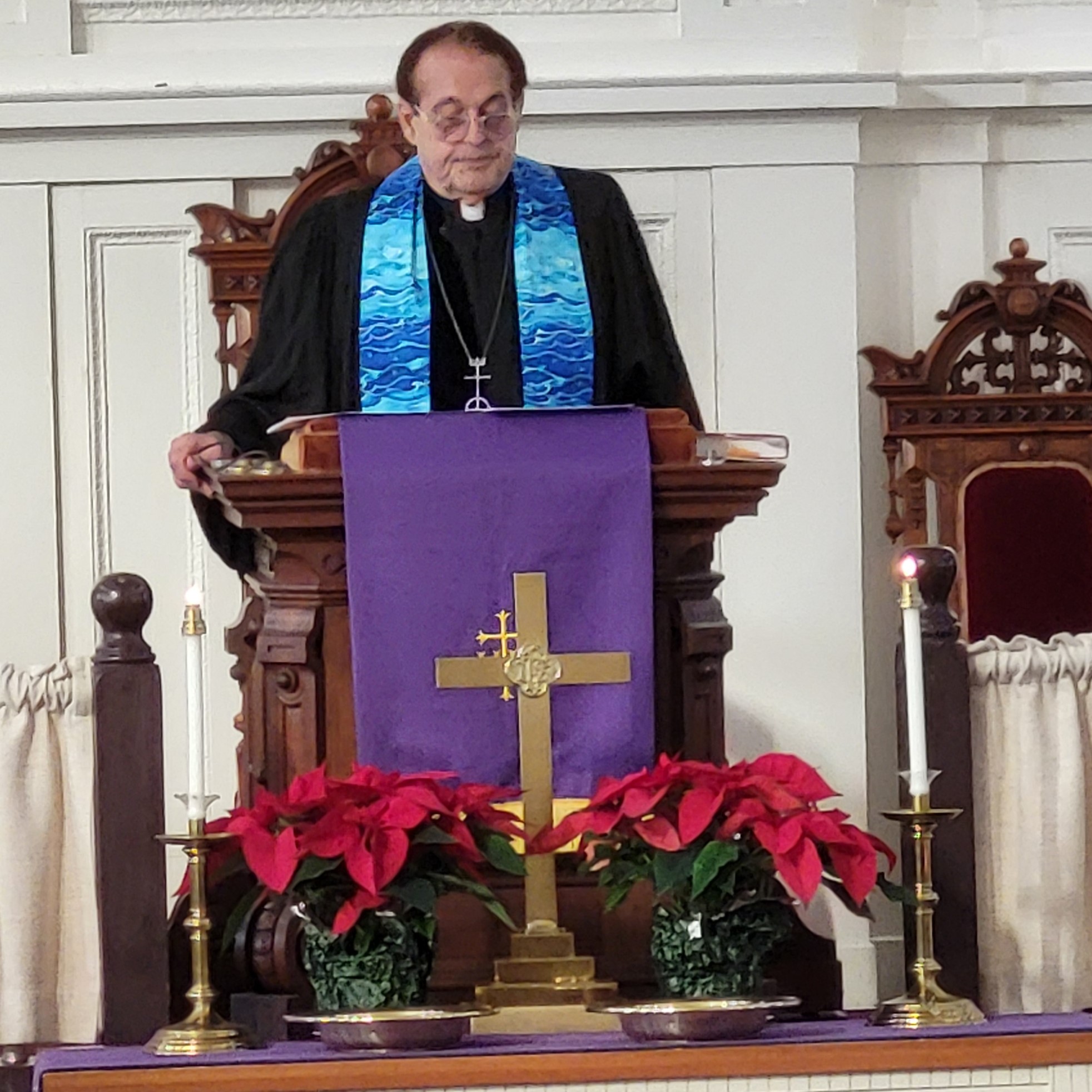Sermon Sunday December 22, 2024 – Fourth Sunday of Advent – Candle of Love
Rev. Norman A. Michaud
“Words of Wisdom: Let it Be”
Luke 1: 39- 45, (46-55)
Today’s reading, Luke 1:39-55, brings us to a face-to-face conversation regarding the world turned upside-down through the incarnation of Jesus. Mary and Elizabeth’s conversation is not a story about religion. It reveals belief and faith, which generate Love.
The scene of Mary and Elizabeth meeting each other reveals their shared experience of pregnancy, with Elizabeth’s child leaping in the womb at the approach of Mary’s child. While still in Elizabeth’s womb, John seems to want to baptize Jesus and leaps at the presence of his cousin, Jesus.
The coming of Emmanuel, the Messiah, is presented by two marginalized women who share the joy of their pregnancies. High priests, prophets, or emperors do not announce the coming births of John the Baptist and Christ. Instead, these coming births are presented by two marginalized, pregnant women, who are cousins. Mary is young, poor, and unwed. Elizabeth is far beyond the age to conceive. They meet in the hill country or wilderness of Judea to celebrate their miraculous pregnancies.
Robin Meyers, a retired pastor and theologian who served as a pastor in the United Church of Christ, dedicates a chapter of his book, “Saving Jesus from the Church: How to Stop Worshiping Christ and Start Following Jesus,” to Virgin Birth. His research shows that the proclamation of Virgin Births was common in the time of Jesus, especially in Roman Culture. Caesar was born through Virgin Birth, hence Caesarian birth. Roman Legion officers would go off to serve in Rome and return to pregnant wives or even newborns. The husbands would embrace their wives and new children and proclaim that, though he had been away, the child was his own, birthed during his physical absence. Virgin births were an accepted and convenient idea for the Roman Empire. But it was reserved for the high and mighty. It would have been a familiar story to those controlled by Rome and accepted as a typical story that many received as fact.
As Protestants, we do not venerate Mary as Catholics do. We do not pray through a Rosary or accept Mary as an intermediary. Instead, we pray directly to God, Christ, and the Holy Spirit. However, in the Catholic tradition, Mary is recognized as the first true disciple of Christ. However, she remains in the shadow of her son, even as he dies on the cross. She is the first to believe her son is the Son of Man, the Son of God, and her belief never wavers.
Mary’s words here are worth reproducing in full. God “has shown strength with his arm,” she says. God “has scattered the proud in the imagination of their hearts.” God “has brought down the powerful from their thrones, and lifted the lowly; he has filled the hungry with good things and sent the rich away empty.” Mary imagines God as the Spirit who will bring low the proud, the Spirit that will bring low powerful rulers who are tyrants and the One that will dismiss the rich. Mary speaks about justice in a clear and consistent voice here and is unafraid to call out the injustices and inequities of her world and ours.
Mary says yes, but that doesn’t mean she successfully banishes her fear. We often focus on Mary’s faithful consent to “let it be with me according to your word.” But perhaps this prevents us from fully imagining her struggle to heed the angel’s reassuring command, “Do not be afraid.”
I wonder if we find Mary’s haste to travel to the Judean hills a fight-or-flight response. What leads Mary to head for the hills—is it the overwhelming divine encounter itself? Or the acceptance and reality of the child in her womb and the life and aftermath of her coming and beloved child?
Mary has reason to be afraid. While Elizabeth’s pregnancy would have been understood by her community as a miraculous sign of God’s favor, Mary’s would have caused alarm. She could face death. In Mary’s time, an unmarried woman found pregnant fell subject to execution by stoning at her father’s front door (Deuteronomy 22).
Under these circumstances, we might empathize with Mary’s decision to put some distance between her newly pregnant body and her father’s threshold. But Mary’s flight to the hill country may be urged on by her survival instinct.
Perhaps this undertone of desperation in Luke 1 leads me to consider Mary one of those thousands of mothers who make the heartbreaking decision to flee their beloved but dangerous homes worldwide. As asylum seekers and their children reach borders, including that of the United States, they are met with separation, and imprisonment. I could not help but wonder if refugees would be openly welcomed if we imagined that Mary (and Jesus) were among their numbers.
The irony, of course, is that truly following the teachings of Jesus, indeed, may threaten our safety as it did for him and his disciples. Yet, following him involves taking risks to love others more deeply, just as he did. When Jesus encountered people who had been marginalized, he took action to restore them to health and participate in the community’s life.
When the fight-or-flight instinct gets the best of us and tells us to hunker down behind a wall of fear, I hope and pray that we will instead walk with Mary to Elizabeth, who emboldens us to love the stranger and greet those strangers who have fled for their lives. let us hear the words of Christ, “Do not be afraid.”
Though not in today’s passage, the lines that set the scene appear before today’s reading in Luke 1: 37-38
“For nothing will be impossible with God.” Then Mary said, “Here am I, the servant of the Lord; let it be with me according to your word.” Then the angel departed from her.”
The Magnificat stands out in the Gospels as a clear statement about how the world should be. We can marvel at this passage, which overflows with life. We can be glad to encounter the story of two named women sharing a conversation. Above all, we listen to the way Mary’s song reimagines the world and Elizabeth’s and Mary’s joy of being together, which points to the way that shows us the Love yet to come.
I hear Mary’s song anew in the lyrics of a fifty-four-year-old song:
And when the broken-hearted people living in the world agree
There will be an answer, let it be
For though they may be parted, there is still a chance that they will see
There will be an answer, let it be
And when the night is cloudy, there is still a light that shines on me
Shining’ until tomorrow, let it be
I wake up to the sound of music, Mother Mary comes to me
Speaking words of wisdom, let it be.
Hope, Peace, Joy, and Love light the world each Advent. Christ is coming! God will be among us, with us, now and always. God’s Love will be incarnate through Mary, the mother of Jesus.


